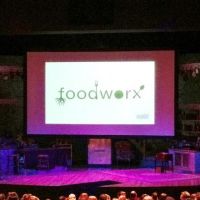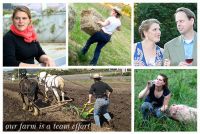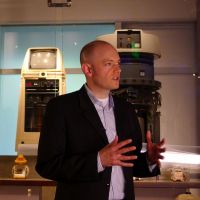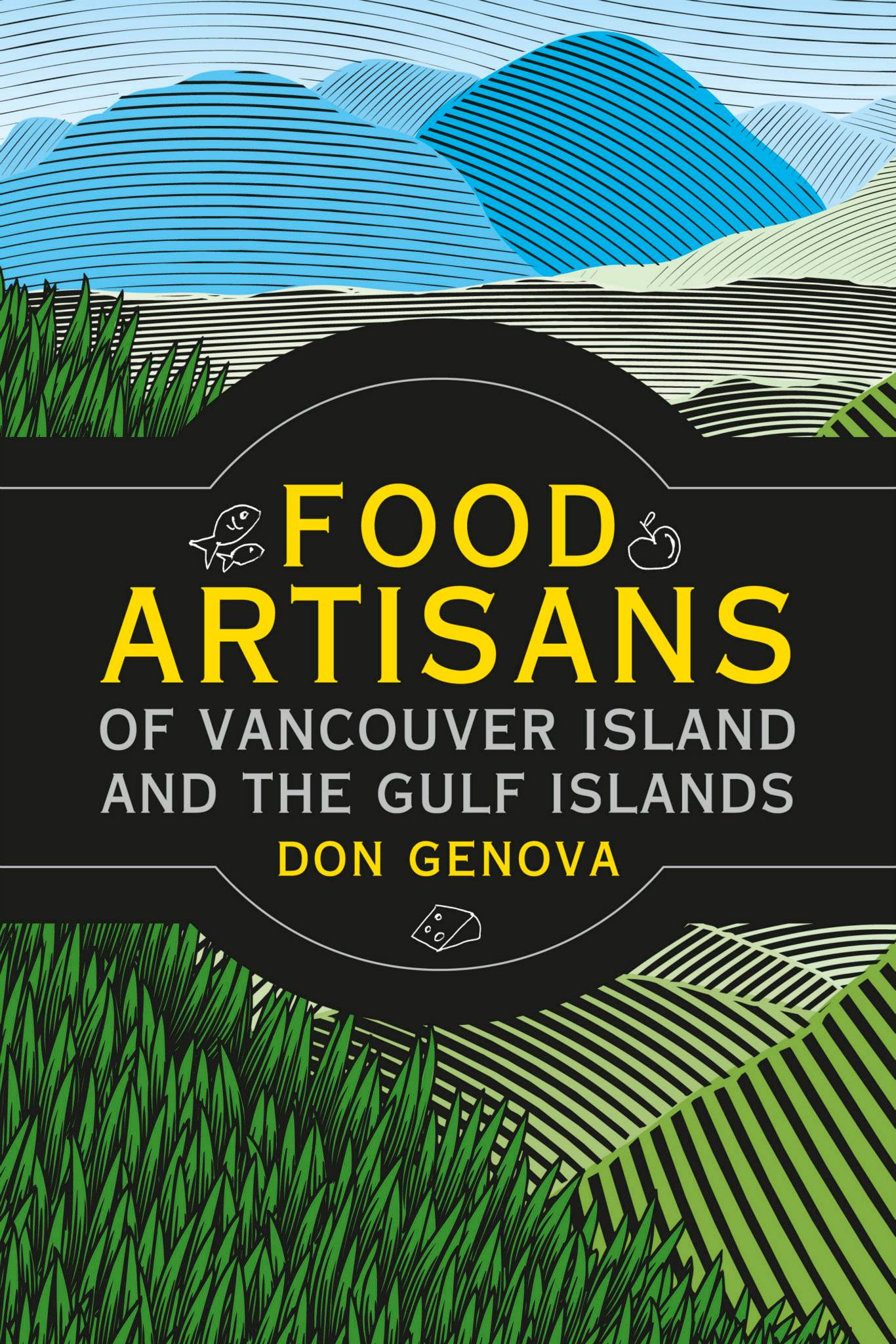 There is more and more talk going on these days about food. We all have to eat, after all, but food is entering into many more discussions than the simple question of what’s for dinner. This week I traveled to Portland for a food conference that presented a sweeping view on food. It was called FoodWorx, the Future of Food. Organized by the World Food Travel Association, which is headquartered in Portland, Foodworx was an attempt to mount a one-day Ted Talks-style series of a dozen speakers. Each speaker got only 20 minutes to present on their topic with a few minutes for Q and A afterwards. The speakers came from a variety of disciplines, some more closely attached to food than others, and the audience came from varied backgrounds as well, including students from a cooking school, the Thompson-Okanagan Tourism Board, and people who run food gleaning programs and other community based food organizations.
There is more and more talk going on these days about food. We all have to eat, after all, but food is entering into many more discussions than the simple question of what’s for dinner. This week I traveled to Portland for a food conference that presented a sweeping view on food. It was called FoodWorx, the Future of Food. Organized by the World Food Travel Association, which is headquartered in Portland, Foodworx was an attempt to mount a one-day Ted Talks-style series of a dozen speakers. Each speaker got only 20 minutes to present on their topic with a few minutes for Q and A afterwards. The speakers came from a variety of disciplines, some more closely attached to food than others, and the audience came from varied backgrounds as well, including students from a cooking school, the Thompson-Okanagan Tourism Board, and people who run food gleaning programs and other community based food organizations.
The day was fairly fast-paced, emceed by a Portland Public Radio host who is obviously familiar with the time limit concept, and the topics were quite well-chosen. I could tell it was a good conference because I left with pages of notes and inspiration.
 Clare Carver
Clare Carver
The very first speaker was Clare Carver, co-owner of Big Table Farm in Oregon. It’s a winery, a cattle ranch, a horse farm and they serve farm to table dinners there as well. She really got us to think about farms of the future in a different way…in one sense a return to the diversity all farms used to have, and in another sense about how new farmers don’t really have to have a lot of experience to get started:
I think every reason that anyone would want to start a farm, or a restaurant, or a food business, is valid, don’t worry about it. If you want to start a farm because you think that red barns are romantic, then start a farm. I’m not saying that it’s not gonna be hard, but that doesn’t mean that’s not a perfectly good reason to start a farm. Part of why I wanted to start a farm is because I love animals. And I love horses, and I thought that this crazy idea of wanting a farm with horses would work, and it kind of does, but it’s been quite the road to get there, I promise you. I’ve broken both my arms and have all kinds of adventures I could tell you about.
Clare also noted for beginners it’s farming by Google, but that having good neighbours, either nearby or on the internet helps a lot.
 Erik Wolf
Erik Wolf
The wildly-popular farm to table dinners they present are one of the kind of experiences Erik Wolf talked about. Erik is the executive director of the World Food Travel Association, and part of his talk keyed on how foodies spend a lot of money, whether they are traveling around the world or across town, and how they are looking for an experience that will create a good memory:
Food and drink are the only art forms that speak to all five senses. You can’t smell a statue or taste a painting but you can use all five human senses when you are eating and drinking. Food and drink are the most important tenets of culinary tourism, or what we now call food tourism. We like to think that we should be promoting a memory, and not a meal. So a restaurant thinks it is just in a business that means serving a meal, they’re in the wrong business, they need to serve a memory, they need to foster that word of mouth promotion that is the most productive and least expensive kind of promotion.
And isn’t it true that when people come back from a trip they are inevitably asked about how the weather was, and then, ‘how was the food?’ You definitely start talking only about the ‘memorable’ food highlights, many of which have to do with more than the food, it’s the setting, the service, the ambience and atmosphere.
Sustainability of our food systems was a big topic at FoodWorx, everything from linking architecture to sustainably-built restaurants to some of the food heroes in America that are now being called social entrepreneurs. These are people who are doing good in the world of food by selling healthy products and giving back to society, but who are also doing a very good job at making money at it. Another very interesting talk came from Heather Schmidt, who talked about food waste. She’s the sustainability manager for New Seasons Market, a chain of locally-owned grocery stores in Oregon that feature local and organic foods. Heather has been looking carefully at her own food waste lately and was
 surprised to find she wasn’t as good at not wasting food as she thought she was, despite her best efforts. I’m going to talk more about food waste next week, but Heather trotted out some fascinating statistics linking obesity, hunger and food waste:
surprised to find she wasn’t as good at not wasting food as she thought she was, despite her best efforts. I’m going to talk more about food waste next week, but Heather trotted out some fascinating statistics linking obesity, hunger and food waste:
The actual size of our dinner plates has increased by 36 per cent since before 1960, and there’s been an increase in calories in common food items like a piece of pizza, which have grown by 70 per cent. So you’ve got a population increase, and you’ve got a greater demand for food, and we’re supposed to be adding four billion people to the planet by the end of this century or sooner. And we’ve also got a warming planet, it effects our food systems, and then we’ve also seen this increase in food waste. So at a time when we need more food, we’re wasting it.
 BrianDavidJohnson
BrianDavidJohnson
The conference concluded with a fascinating talk from Brian David Johnson, a futurist from the Intel Corporation. This is a guy who is already dreaming up what your computer will be able to do in the year 2020…and that includes a computer you can eat:
They’re actually making computers that are made out of silicon and silk and magnesium that you’ll be actually able to eat them. Now that may sound a little bit freaky but if you’ve got a really bad stomach problem and have no idea what’s going on, being able to swallow a tiny little analyzer that has some wi-fi attached to it that can just send out what’s going on down there is really important. Oh and by the way the amount of magnesium you would swallow is less than you would get by eating a multivitamin pill. So as we start thinking about the future of food, it’s not only thinking about science fiction stuff like Soylent Green,
we’re getting a lot closer being able to bring technology and food together, in an interesting way, and in a way I argue can make a pretty dramatic change.
If you want to hear my chat about the conference on All Points West, just go to this page, where the audio will eventually be posted. I’ll have a bit more from the conference next week.


